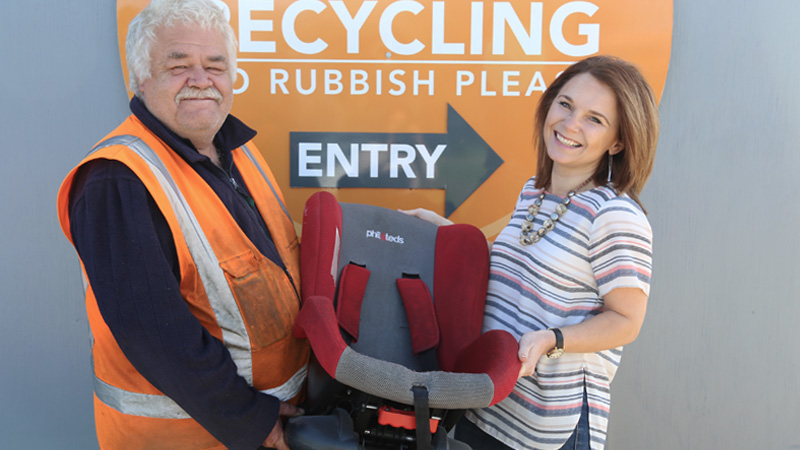Child car seat recycling programme expands into Palmerston North
Our SeatSmart child car seat recycling programme keeps expanding and we are really pleased to kick 2018 off with a new collection site in the North Island.
The programme, which is currently operating in eight regions around New Zealand, will be available at the Ferguson Street Recycling Centre in Palmerston North from Saturday 13th January.
This makes it the 21st site in New Zealand, after the Palmerston North City Council partnered with SeatSmart. Councillor Rachel Bowen, whose portfolio includes children and families, says she is delighted with the partnership.
“Child car seats save lives every day, but can generate an excessive amount of waste when no smart disposal channels are made available. With SeatSmart we’re able to provide our residents an environmentally responsible option for disposal, and by doing so remove expired and unsafe car seats off the market.”
SeatSmart was created by Hastings-based recycling specialist 3R Group. It was launched nationally in April 2016 and recently saw its 6,000th seat collected.
At least 40,000 child car seats reach their expiry date each year in New Zealand. Most end up in a landfill, despite around 90 per cent of a typical seat being recyclable.
“We’re excited that the City Council have come on board to allow us to expand collections into Palmerston North,” says Toni Bye, SeatSmart programme manager.
“At 3R, we’re constantly looking at everyday items like car seats that are highly recyclable and asking ‘why does that need to go into landfill?’
“Partnerships such as this with the Council make it possible for us to create programmes like SeatSmart that have a positive impact on the environment and improve road safety for Kiwi kids.”
Expired or damaged seats can be taken to the Ferguson Street Recycling Centre. A fee of $5 per seat will be charged to cover the cost of recycling, half the usual fee thanks to support from the council.
Collected seats are sent to be dismantled by offenders in Department of Corrections community work programmes.
The plastic from the seats is recycled into new products used in the building industry and metal parts are also easily recycled. Straps from the seats are used to make recycled bags.
SeatSmart collects seats in Auckland, Hamilton, Tauranga, Whanganui, Hastings, Kapiti Coast, Wellington, Hutt Valley, Nelson, and parts of Canterbury with support from a number of local councils. Full details can be found at www.SeatSmart.co.nz.
Read the subsequent news story in the Manawatu Standard.







